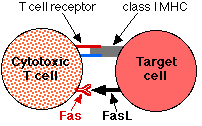
For many years it has been known that certain parts of the body such as
are "immunologically privileged sites". Antigens within these sites fail to
elicit an immune response. 
It turns out that cells in these sites differ from the other cells of the body in that they express high levels of FasL at all times. Thus antigen-reactive T cells, which express Fas, would be killed when they enter these sites. (This is the reverse of the mechanism described above.)
This finding raises the possibility of a new way of preventing graft rejection.
If at least some of the cells on a transplanted kidney, liver, heart, etc. could be made to express high levels of FasL, that might protect the graft from attack by the T cells of the host's cell-mediated immune system. If so, then the present need for treatment with immunosuppressive drugs for the rest of the transplant recipient's life would be reduced or eliminated.
So far, the results in animal experiments have been mixed. Allografts engineered to express FasL have shown increased survival for kidneys but not for hearts or islets of Langerhans.